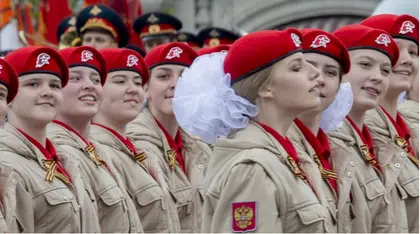The Russian military-patriotic youth movement known as Yunarmia was formed in 2016, the brainchild of Russia’s Minister of Defense Sergei Shoigu.
Its website portrays it as akin to the boy scout or girl scout movements, saying that each participant “has access to hundreds of exciting events, the opportunity to study technology and play sports” through its regional headquarters based in 89 regions of Russia.
JOIN US ON TELEGRAM
Follow our coverage of the war on the @Kyivpost_official.
Further review of the website reveals a darker motivation, stating that members are organized into “Yunarmia Houses,” where members “master the basics of military training, develop leadership skills, and acquire scientific and technical competencies,” in which they “will learn special knowledge and skills, to decide on your future profession.”
In Russia, joining the movement is voluntary, but there are signs that children and teens in the occupied areas of Crimea, Donetsk, Luhansk, Kherson, and Zaporizhzhia are being forced to join for fear of reprisals against them and their families if they refuse.
Evidence gathered by Ukrainian groups such as Kyiv’s National Resistance Center and NGOs such as Crimea SOS and Almenda shows that Ukrainian children as young as eight years old are pressured to join and are effectively being made to become Russian.
The UkraineWorld media site reported that in combination with the efforts of the Yunarmia movement and enforcing a Russian-language syllabus in school, Ukrainian children are being brainwashed, militarized and even forced into contributing to the Russian war effort by being made to write letters of support and putting together humanitarian aid boxes for Russian troops.

Russia Gave N. Korea Oil, Anti-Air Missiles in Exchange for Troops: Officials
Sabina Iliasov, a coordinator working with Crimea SOS, told The Daily Beast news site: “Before the invasion, the main purpose [of Yunarmia was] patriotic education. [It] talked about family, values, patriotism, what does it mean to be a patriotic citizen of your country.”
She then went on to say, however, that the narrative changed after Russia’s 2022 full-scale invasion. Now the movement continually praises President Vladimir Putin, the so-called “special military operation,” claiming that the country is “de-Nazifying” Ukraine as it had done in Germany in World War II.
Yunarmia runs a program that includes camps, activity centers, military training sessions, computer-based games and lessons, sports and educational competitions. All of it is accompanied by propaganda aimed at reinforcing the central message – Russia good, Ukraine bad.
Iliasov also said: “In that way, they try to impose… that Ukraine is the first enemy, and other countries, the European countries and especially the US, all of them are enemies.”
She added that according to the Yunarmia doctrine “there is no greater support [for the Russian army] than children’s belief in victory over the common enemy.”
According to Dmytro Lubinets, Ukraine’s human rights ombudsman, Russia has created a network of more than 70 special camps for the “re-education” of Ukrainian children in Russia and in Ukraine’s occupied territories with the aim of making them future fighters for Russia.
Throughout the Russian Federation, a new curriculum for the entire educational system has been adopted in 2023. Alongside normal subjects, it incorporates enhanced elements of military skills and the Kremlin’s interpretation of Ukraine’s place in Russian history.
Yunarmia uses social media extensively to press its messages. One example is the YunarmiaKherson Telegram channel, which is flooded with information relating to Russian music and art but also shows images of young teenagers firing Kalashnikov assault rifles.
Other Telegram channels linked to the organization shows kids learning to fly FPV drones loading guns, shooting at targets, and putting on gas masks and personal protection equipment.
Mariia Sulialina, head of the Almenda NGO, says one of the most challenging aspects of Ukraine’s post-war world will be the reintegration of the children who joined Yunarmia and have been taught to hate their own people.
“Russia is changing the identity of the youngest, who are the most vulnerable to this kind of propaganda. They are victims of this system; they are victims of Russian propaganda.”
You can also highlight the text and press Ctrl + Enter






